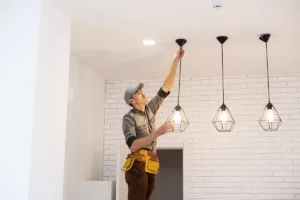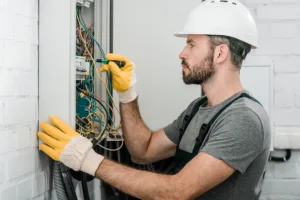How to Protect Your Home From the Most Common Causes of Electrical Fires
According to an official report released by the National Fire Protection Association (NFPA), in the U.S. there were more than 80,000 home fires each year in 2012-2016 involving electrical issues.
Reducing the risk of a possible electrical fire starts with knowing what to look for in your home. This article highlights some of the most common causes of electrical fires in homes and what you can do to prevent them.
1. Outdated Wiring
For many years, the majority of homes built in the U.S. used aluminum wiring as opposed to modern copper wiring simply because it was more affordable. Over time it became clear that aluminum wiring is more susceptible to overheating, and significantly raises the risk of house fires.
Nowadays, with all the modern technology in our homes and the amounts of energy used, outdated wiring is even more likely to heat up quickly and potentially start a fire.
Signs the wiring in your home may be outdated include:
- Regularly overloaded circuit breaker
- Erratic power outages
- Lights flickering or dimming on their own
- Visibly frayed wires
- Areas on walls or outlets feel hot
- Outlets that shock, spark, or are melted or singed
- Strange burning odors
- Crackling or buzzing sounds
Fire Prevention: If your home was built more than 30 years ago, or you aren’t sure what type of wiring was used in your home, contact the electricians at Schafer Electric to schedule a full electrical inspection.
2. Overloaded Electrical Panels
The electrical panel is the hub of your home’s entire electrical system. All of the electricity you use to power electronic devices travels through it first, so any issue with the electrical panel will affect your entire home. If your electrical panel is old, corroded, or installed improperly it can be a very dangerous fire hazard.
A compromised and dangerous electrical panel will not be able to reliably trip the breakers to your wiring which can allow too much electricity to flow through them. Too much electrical voltage flowing through a circuit will cause it to overheat and melt away the insulation exposing live, hot wires which can quickly spark a fire.
Fire prevention: If your home frequently experiences tripped breakers or power fluctuations, this could indicate that your electrical panel is compromised and should be inspected by an electrician immediately.
3. Misused Extension Cords
Misused extension cords are another very common cause of electrical fires. As convenient as extension cords are, they are actually only intended to be used temporarily. Even modern extension cords may not have the capacity to support the appropriate amount of wattage required to power multiple devices for long periods of time.
Furthermore, it’s very common for people to snake extension cords behind large pieces of furniture, or under rugs, where they are much more likely to overheat and become a serious fire hazard.
Fire prevention: If your home does not have enough electrical outlets available it is much safer to have an electrician install more. In cases where you do need to use an extension cord for a short period of time, make sure it is in an area where it can’t be stepped on or covered by a rug. If your extension cord is damaged in any way do not try and repair it yourself, just replace it.
4. Older Power Outlets
Over the years, our dependence on electricity has significantly increased. Many households have multiple personal devices that need regular charging as well as large stationary appliances like your refrigerator that need continuous power.
In older homes, and even new ones, this constant use will naturally cause wear and tear on a power outlet like loose wiring. If left unattended, eventually, these wires can break and spark a fire.
Furthermore, homes with outlets that are not properly grounded are at a higher risk of electrical fires. A grounded outlet has three prongs, including a hot, neutral, and ground slot. In case of a power surge, the grounded slot offers a safe route for the extra electricity to escape.
Fire prevention: If you notice an outlet sparks, is hot to the touch, appears damaged in any way, or it feels loose, do not use it and call an electrician immediately. Additionally, it would be wise to replace any ungrounded outlets with ground ones and have GFCI outlets (ground fault circuit interrupter) installed in your kitchen and bathroom.
5. Older Appliances
That blender from the 1960s might seem like it still works just fine, but it is possibly a fire hazard. Many old appliances lack modern safety protections like temperature and timer shut-offs or anti-tip protections. They are also more likely to have worn parts and frayed wiring from years of long use.
Older appliances are also likely not up to standard wattage use, or not made with the most quality of materials, making them increasingly risky to use in your home.
Fire Prevention: Unplugging devices and appliances when they are not in use can rescue the risk of an electrical fire. That said, to avoid potential fires your best bet is to replace older appliances with new modern ones.
6. Portable Heaters
Portable heaters, otherwise known as space heaters, are common causes of home electrical fires. The most frequent reason is people placing these heaters near a bed, curtains, couch, or other highly combustible surfaces. Space heaters can become extremely hot, and if placed too close to flammable material, they can ignite a fire very quickly.
Additionally, space heaters are intended to be plugged directly into a grounded outlet (not an extension cord) and placed on the floor with a minimum 3-foot radius of space around it.
Fire Prevention: Ensure you always place your heater away from anything potentially flammable, and also on a hard flat surface. Never leave a space heater unattended and always unplug it when it’s not in use.
Contact Schafer Electric for an Electrical Safety Inspection
Electrical fires are more common than they should be, but becoming familiar with the most common causes, and immediately attending to electrical issues, can greatly reduce the risk of one in your home. Regularly test and check the batteries in all the fire alarms, smoke detectors, and carbon monoxide detectors throughout your home.
The certified electricians at Schafer Electrical are here to answer any of your electrical safety questions. Contact our team today at 707-545-3300 or online to schedule a safety inspection today.





No comments yet. Add the first comment